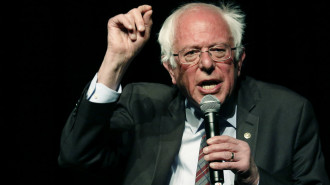Despite Israel's war and no outside help, Palestinians in Gaza bring Al-Shifa Hospital partially back to life
Palestinians in the Gaza Strip are working to thwart Israel's genocidal goals to render their war-torn coastal enclave uninhabitable as its war of extermination continues for the ninth consecutive month.
In one recent case, Palestinian residents were able to restore sections of Al-Shifa Hospital, the largest medical complex in Gaza City, and help it to receive patients once again even with little equipment or medical staff.
In separate interviews with The New Arab, locals said they used basic materials available to them in the city to rebuild what could be restored and usable.
"Israel has always wanted to kill the life in us, but we insist on continuing our lives even in the most difficult circumstances we are going through," Abu Mohammed, one of the workers who participated in the restoration of the hospital, remarked to TNA.
For Abu Mohammed, who preferred to keep his family name anonymous, the experience was not easy for him to be part of the team that restored the hospital, especially since he lost three members of his family when the Israeli army stormed during this war.
"Here my son, my brother and my mother were killed," Abu Muhammad told TNA, his face filled with sadness. "The Israeli army executed them in cold blood without even checking their identities or knowing that they were just civilians hiding in the hospital from death."
After his loss, Abu Mohammed thought he wouldn’t be able to visit Al-Shifa because he didn't want to imagine the scene where his family members were executed.
"For the past two months, I felt angry, sad and oppressed by the scale of the Israeli crimes committed against our people in Gaza. I thought we were just waiting for death and that we wouldn’t survive this war and that Gaza wouldn’t regain its life even after years," he said.
But as soon as Abu Mohammed was called on to be part of the team that intended to renovate the hospital, he felt it was his chance to take revenge against Israel.
"I don't have a weapon and I don't know how to use it, but I have my own internal power, which is to rebuild what Israel destroys... This is our real strength. Israel creates death, and we create life in our land and homeland," he remarked.
With the help of dozens of Palestinian workers in the area, Abu Mohammed succeeded within a few days in restoring the maternity ward at Al-Shifa Hospital using what available equipment remained.
The workers at Al-Shifa Hospital proudly shared dozens of photos of the maternity ward after its restoration, comparing them to those photos that spread after the Israeli army invaded and completely destroyed this department and others.
As the photos of the Al-Shifa's renovation widely spread, most social media users described the photos as "an unbelievable historical scene" and "shocking scenes for Israel," especially after the massive destruction that befell the hospital and the ongoing closure of all crossings.
"We are a people who cannot be defeated, even if Israel destroys everything in Gaza, but life still beats within us […] We can rebuild our city, restore it, and return it better than it was if the war ends," Rana Matar, a displaced Palestinian in Gaza City, said to TNA.
"What really hurts us is the betrayal (…) No one was able to give us the strength and force Israel to end its war. However, amidst the death, destruction, and bombing, our people were able to prove to the world that we are capable of continuing life and making it with our own hands," she added.
Matar believes that "the scene of the restoration of parts of the hospital is not only delivering a message for Israel but also for the world, that the Palestinian people are a mighty and will not surrender to injustice and death, no matter what happens to them."
The Israeli occupation army withdrew from the Al-Shifa Medical Complex on 1 April, after which multiple mass graves of patients, their families, and medical staff for two weeks were left behind.
The Euro-Mediterranean Human Rights Monitor's estimates indicated that more than 1,500 people were killed, injured, or missing, half of whom were women and children.
The monitor said that the bodies of the dead were not spared from being mutilated, burned or trampled by vehicles and bulldozers.




 Follow the Middle East's top stories in English at The New Arab on Google News
Follow the Middle East's top stories in English at The New Arab on Google News
![The US vetoed a UN Security Council (UNSC) resolution demanding a ceasefire in Gaza [Getty]](/sites/default/files/styles/image_330x185/public/2185152251.jpeg?h=7ef8ac04&itok=RpLSj2pu)

![An attack by paramilitary forces in Sudan has killed at least 40 people [Getty]](/sites/default/files/styles/image_330x185/public/2182364341.jpeg?h=a5f2f23a&itok=r8Fkhxdj)